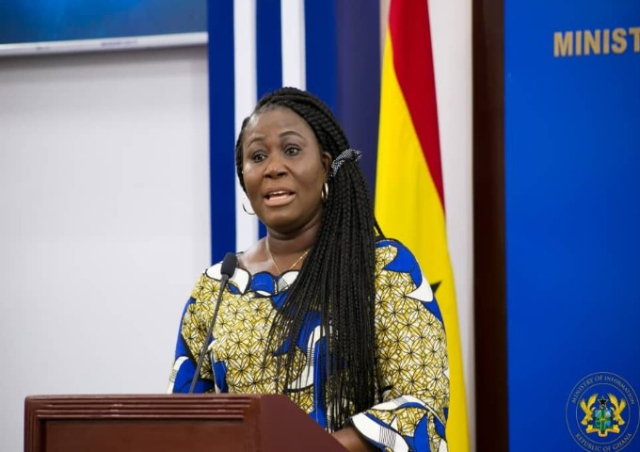
The minister of Fisheries and Aquaculture Development, Mrs Elizabeth Afoley Quaye, has said the recent decline in annual yields of small pelagics from approximately 130,000 metric tonnes (MT) 10 years ago to about 30,000 MT has forced government to review the Fisheries Acts.
She said the reasons for this drastic decline included over-fishing and unreported and unregulated fishing practices.
Addressing the gathering of journalists at the beginning of a five-day Fisheries Management Training put together by the Ministry and Centre for Coastal Management and Nature yesterday, she said the training would help contribute positively to the national cause.
“I am informed that the short course will discuss issues of (1) Fisheries Management; (2) Closed Season: At Whose Cost and for Whose Benefits?; (3) Closed Seasons: Implications for Fisheries Management in Ghana; (4) Community-Based Fisheries Management;(5) Legal aspects; (6) Tools for Managing Fisheries; and (7) Post-harvest issues (processing, loss, marketing, transport, storage, etc.).
“Discussions on these topics are of great national significance at this critical time when key stakeholders — government, fisheries practitioners, scientists and the private sector — are deeply concerned about the decline in fisheries output, and the ongoing coastal degradation.
“Government is tackling the issues head-on, including a review of the Fisheries Act to reflect current needs and trends; the new policy on co-management is also far advanced in its drafting,” she noted.
Anomabo Fisheries College to be under UCC
Mrs Quaye, who doubles as the Member of Parliament for Krowor, said, “the contributions of the government and my ministry [have resulted in the establishment of] the Anomabo Fisheries College to be run under the University of Cape Coast (UCC).
“The College is anticipated to begin next academic year (2020/2021) and will seek to promote the training of fisheries artisans, including boat and net maintenance technicians, and provide certification for fishermen in fisheries management.
“I am reliably informed that the curriculum is completed and also covers degree training from undergraduate to the PhD level at the College.
“I want to commend UCC for its contribution to government’s effort on this score. I wish to encourage participants to visit the premises of the College, should you have the space to do so within the course period.”
UCC, a pillar in fisheries management
The Minister reminded that, “since 2015, the University of Cape Coast, as part of its USAID-funded Fisheries and Coastal Management Capacity Building Support Project, has organized several short training courses on Fisheries Management among other important short courses like Integrated Coastal Zone Management, GIS for coastal area planning and Climate Change Adaptation, all in support of the fisheries sector.
According to her, “I am reliably informed that this intervention has benefitted about 300 professionals drawn from the Ministry of Fisheries and Aquaculture Development (MoFAD), the Fisheries Commission, NADMO and MMDAs among others.”
Poverty Alleviation
The Minister noted that these trainings reaffirm the commitment of UCC to the sustainability of Ghana’s fisheries and coastal resources in support of the work of the Ministry to contribute significantly to food security, employment and poverty alleviation.
“The Ministry is most grateful to the United States Agency for International Development (USAID) for supporting our capacity building efforts through provision of financial assistance to roll out these courses.”
While expressing joy at the partnership of UCC’s Centre for Coastal Management and the Department of Fisheries and Aquatic Sciences over the past five years, she said “it has led to development of several initiatives, including policy, training, research exchanges, and other important partnerships with the Ministry.”
She added that the significance was that the Conference on Fisheries and Coastal Environment, led by the Centre in cooperation with the Ministry had raised strong awareness of the need to sustain the sector.
But Mrs Afoley Quaye expressed regret the “USAID’s support for these important projects will terminate next year.”
“I am very happy to note that this particular short course will highlight scientific issues in the fisheries sector, contributions and achievements of the sector, success stories and inherent challenges.”
Gratitude
Mrs Quaye also expressed gratitude to members of the planning and organizing committee from the Centre for Coastal Management, Nature Today and the Ministry of Fisheries and Aquaculture Development for the great job done towards realization of this dream.
“Indeed, this training will provide an important platform for you journalists and representatives from civil society groups and the media as a whole to connect around issues of vital national interest concerning sustainable fisheries and coastal management in Ghana.
“It is, therefore, very appropriate as it encompasses the full spectrum of issues confronting our marine and coastal environment.”
Training outcome
The minister expressed the hope that the training would help to mobilize relevant stakeholders to address issues of fiheries, and give momentum and political will to sustainably manage the fisheries and coastal resources with effects lasting well beyond this conference.
She urged all the participants, students, scientists, government, development partners and civil society groups to work together towards this goal.
The Director of Enu Ansah Farms, Mr Jacob Enu-Ansah, called on the government to bring in researchers from both academia and industry to help improve on fisheries management.
The Pro-Vice Chancellor of UCC, Prof Dora Francisca Edu Bandoh, said her outfit was always ready to champion the cause of fisheries management.
She called on Ghanaians to choose UCC to study courses in fisheries management.
Source: Ghana/Starrfm.com.gh/103.5FM/Muntalla Inusah

